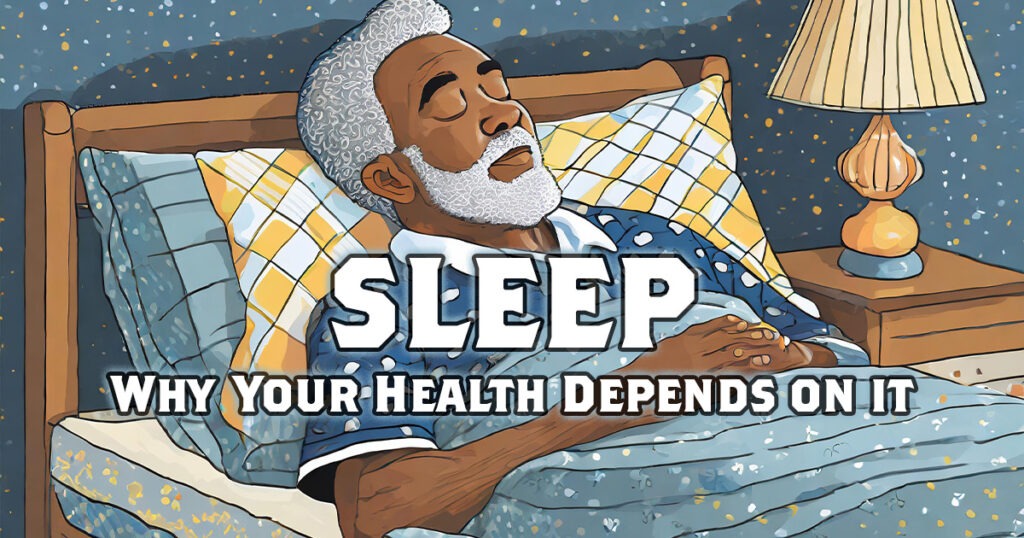Why Sleep Matters

“I’ll sleep when I’m dead” is a common mantra among those who are focused and driven toward their goals; however, what many of these people fail to realize is that neglecting quality sleep can ultimately lead to poor health and even premature death.
Nearly every major illness afflicting developed countries—ranging from cancer, Alzheimer’s, and diabetes to cardiovascular diseases, stroke, and even suicide—has a significant connection to insufficient sleep. Erica Jansen, a distinguished Research Assistant Professor of Nutritional Sciences, defines sleep as an altered state of consciousness where we have limited interactions with our surroundings and are relatively quiet and still. Sleep is indispensable to every bodily process, akin to the necessity for us to breathe air and eat food. Matthew Walker, a neuroscience and psychology professor at the University of California Berkeley, who has published over a hundred scientific studies, emphasizes the catastrophic repercussions of sleep deprivation on our health, work productivity, and children’s education. Insufficient, poor-quality sleep escalates the risk of various health issues, including heart disease, stroke, weight retention, and dementia.
How Much Sleep Do I Need?
According to studies, most adults need 7 to 8 hours of sleep. Getting the quantity of required sleep is only half the battle. Good quality sleep is also needed because tossing and turning all night can interfere with its benefits. One should feel well-rested when they awake.
Children need even more sleep. According to the Office of Disease Prevention and Health Promotion, teens need 8 to 10 hours of sleep each night, while school-aged children need 9 to 12 hours. Moreover, preschoolers need to sleep between 10 to 13 hours a day, including naps. Toddlers need to sleep between 11 to 14 hours a day, including naps. Babies need to sleep between 12 to 16 hours a day, including naps, and newborns need anywhere from 14 to 17 hours of sleep each day.
Your brain performance, mood, and health improve when you get good-quality sleep. Just as important— the body heals while you’re sleeping. Combined with a clean diet, exercise, and plenty of sunshine and fresh air, children and adults alike who get good quality sleep each night, or at least most nights, also enjoy the following benefits:
- Get sick less often
- Heal quicker when they do get sick
- Have a better ability to maintain a healthy weight
- Can focus and think more clearly
- Typically deal with less stress
- Have a better mood throughout the day
- Reduce the risk of developing certain diseases
- Have digestion systems and metabolism that function more efficiently.
- Are more alert and less likely to cause accidents
Does It Matter When I Sleep?
Considering the role of our sleep patterns, it’s fascinating how our bodies seem to sync up with the rhythm of the day, nudging us toward sleep as night falls. This natural alignment, guided by our internal “biological clock,” keeps us alert during the day and signals it’s time to recharge come nightfall. This synchronization isn’t just a quirk—it’s what helps us consolidate memories and perform at our best. And it’s been going on eons before we had electric lights to mess with our sleep. As we shall discover, the invention of electricity, which brought us light to brighten the dark, has its downside, too.
In today’s hustle and bustle, things can get a bit off track, especially for folks on the night shift. And it’s not just about feeling a bit groggy—it turns out there could be some serious health consequences. Research is pointing to a link between working late hours and a higher risk of cancer. It’s gotten so serious that the World Health Organization labels nighttime shift work as a likely cause of cancer, mainly because it throws our natural sleep rhythms for a loop. This isn’t just about getting enough shut-eye; it’s about aligning our lives with what our bodies need to stay healthy and balanced. So, when it comes to the timing of our sleep, it’s not just a matter of convenience—it could be a real game-changer for our well-being.

Nighttime shift work is a likely cause of cancer, According to the World Health Organization.
Why Is Sleep Essential?
The brain is very active during sleep, carrying out many essential functions. When people feel off and unable to focus or function normally, they often say, “I didn’t sleep well last night.” This is because sleep affects your mental and physical functioning. Sleep touches every aspect of your health; it strengthens your immune system and improves your ability to fight diseases. Repeatedly not getting good quality sleep is associated with impulsive behavior, anxiety, depression, paranoia, and suicidal thoughts. Other health issues and negative impacts associated with poor sleep include:
- Weakened immune system
- Heart disease
- Kidney disease
- High blood pressure
- Stroke
- Obesity
- Diabetes
- Poor attention span and poor attention to detail
- Poor cognitive function
- Low sex drive
What Happens To Men When They Don’t Get Enough Sleep
According to Matthew Walker, men who sleep five hours a night or less have significantly smaller testicles than those who sleep seven hours or more. In addition, men who routinely sleep just four to five hours a night will have a lower level of testosterone than someone ten years their senior who routinely gets seven to eight hours of good quality sleep each night, or at least most nights. So, a lack of sleep will age a man by a decade in terms of that critical aspect of wellness.
Factors That Affect Sleep Quality
Believe it or not, many factors can affect sleep quality, from diet to sleeping pills. Below is a list of factors that commonly affect sleep.
- Diet—Caffeine in soft drinks, tea, and coffee is a huge part of many people’s diets. Consuming caffeine in the evening will most likely disrupt sleep. Opting for decaf coffee or caffeine-free tea is a better option.
- Stress – Too much stress can make you anxious and tense and cause problems with sleep. When the body experiences stress, it releases cortisol, a hormone that can disrupt the sleep-wake cycle. We all deal with stress at one point or another in our lives, but when it routinely disrupts sleep, it can have devastating health consequences.
- Pain – Many people are unable to sleep through the night due to chronic pain.
- Eczema and other skin disorders – Dry, itchy skin caused by eczema and other disorders can disrupt people’s sleep, making it even more difficult for their bodies to heal.
- Medication – Some medications cause insomnia and restlessness.
- Smoking – Cigarettes contain nicotine, a stimulant that makes it hard for smokers to fall asleep.
- Alcohol – While alcohol may help a person fall asleep quickly, it hinders sleep quality, often causing fragmented sleep.
- Sleeping pills – Initially, sleeping pills may work great, but over time, they make it harder for your body to fall asleep naturally.
- Screens – The blue light emitted from the screens of laptops, cell phones, and televisions can affect the secretion of melatonin, a hormone that helps signal the body that it is time to fall asleep.
Ways To Improve Sleep Quality
- Be consistent – Go to bed at the same time each night and get up at the same time each morning, including weekends.
- Atmosphere – Ensure that your room is quiet and dark. It can be difficult to fall asleep and stay asleep in a room that is too warm or hot, so ensure that you have a comfortable temperature. Remove electronic devices, such as TVs, cell phones, and laptops, from your sleep room.
- Avoid reading emotionally driven articles or books. Avoid watching scary movies right before going to bed.
- If you consume alcohol, it is recommended to do several hours before going to bed so that it is entirely out of your system before falling asleep.
- Manage stress by practicing relaxation techniques such as meditation and deep breathing. Move your body by getting moderate exercise.
- If you consume caffeine, avoiding it in the afternoon and evening hours is recommended.
- Reduce fluid intake right before bedtime.
- Avoid large meals right before bedtime.
- Don’t take naps after 3 pm.
- If you don’t fall asleep after 20 minutes, get out of bed and do a quiet activity without much light exposure.
- Avoid nicotine.
- Massaging or rubbing castor oil in your belly button. Castor oil helps calm and relax the body to get better sleep. This method works well over 90% of the time for me and is my personal favorite method.
In Conclusion
Not getting enough sleep drains your mental abilities and risks your physical health. You owe it to yourself to incorporate lifestyle choices that promote good-quality sleep. Join me in my next article, in which we will explore sleep disorders. Until then, sleep well and happy healing. See you soon.
Related Links
The Hidden Dangers of Birth Control Pills
Candida Overgrowth: Causes, Prevention & Remedies
